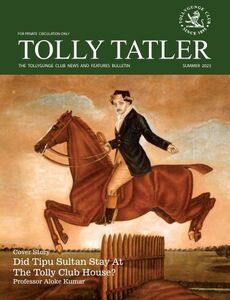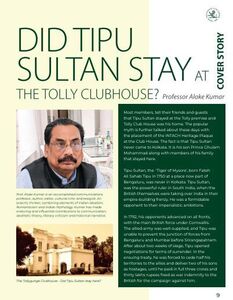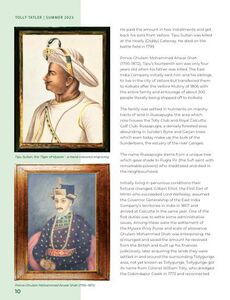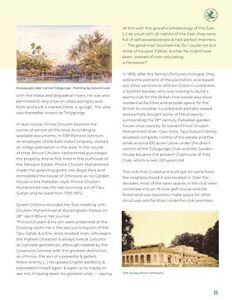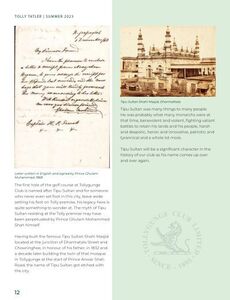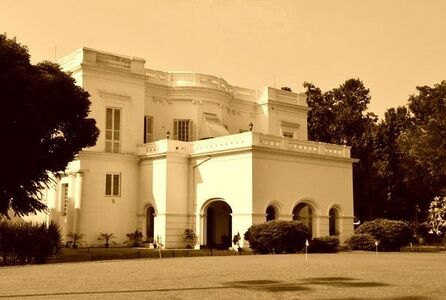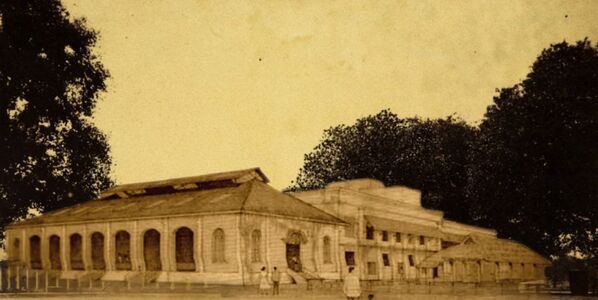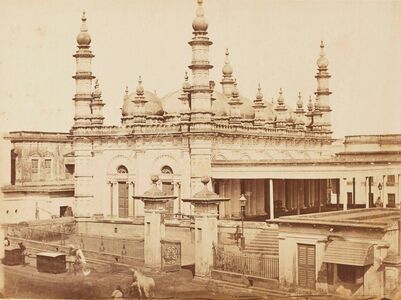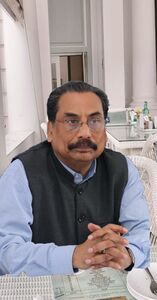Most members, tell their friends and guests that Tipu Sultan stayed at the Tolly premise. And Tolly Club House was his home. The popular myth is further talked about these days with the placement of the INTACH Heritage Plaque at the Club House. The fact is that Tipu Sultan never came to Calcutta. It is his son Prince Ghulam Mohammad along with members of his family that stayed here.
Tipu Sultan, the `Tiger of Mysore', born Fateh Ali Sahab Tipu in 1750 at a place now part of Bangalore, was never in Calcutta. Tipu Sultan, was the powerful ruler in South India, when the British themselves were taking over India in their empire-building frenzy. He was a formidable opponent to their imperialistic ambitions.
In 1792 his opponents advanced on all fronts, with the main British force under Cornwallis. The allied army was well-supplied, and Tipu was unable to prevent the junction of forces from Bangalore and Bombay before Srirangapatnam. After about two weeks of siege, Tipu opened negotiations for terms of surrender. In the ensuing treaty, he was forced to cede half his territories to the allies and deliver two of his sons as hostages, until he paid in full three crores and thirty lakhs rupees fixed as war indemnity to the British for the campaign against him. He paid the amount in two instalments and got back his sons from Vellore. Tipu Sultan was killed at the Hoally (Diddy) Gateway. He died on the battle field in 1799.
Prince Ghulam Mohammad Anwar Shah (1795–1872), Tipu’s fourteenth son was only four years old when his father was killed. The East India Company initially sent him and his siblings to live in the city of Vellore but transferred them to Calcutta after the Vellore Mutiny of 1806 with the entire family and entourage of about 300 people literally being shipped off to Calcutta.
The family was settled in hutments on marshy tracts of land in Russapugla, the area which now houses the Tolly Club and Royal Calcutta Golf Club. Russapugla, a densely forested area abounding in Sundari, Byne and Garjan trees which even today make up the bulk of the Sunderbans, the estuary of the river Ganges.
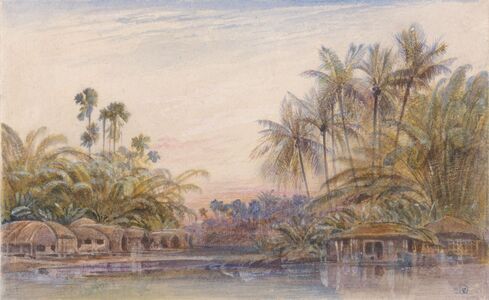
Initially living in penurious conditions their fortune changed. Gilbert Elliot, the First Earl of Minto who succeeded Lord Wellesley, assumed the Governor Generalship of the East India Company’s territories in India in 1807 and arrived at Calcutta in the same year. One of the first duties was to settle some administrative issues. Among these were the settlement of the Mysore Privy Purse and scale of allowance. Ghulam Mohammed Shah was enterprising. He scrounged and saved the amount he received from the British and built up his finances judiciously, later acquiring the lands they were settled in and around the surrounding Tollygunge area, not yet known as Tollygunge. Tollygunge got its name from Colonel William Tolly, who dredged the Gobindapur Creek in 1773 and reconnected with the Matla and Bidyadhari rivers. He was also permitted to levy a tax on ships plying to and from and built a market there, a ‘gunge’. The area was thereafter known as Tollygunge.
In due course, Prince Ghulam became the owner of almost all the land. According to available documents, in 1781 Richard Johnson, an employee of the East India Company, started an indigo plantation in the area. In the course of time, Prince Ghulam Mohammed purchased the property and at first lived in the outhouse of the Johnson Estate. Prince Ghulam Mohammed made the sprawling green into Royal Park and remodelled the house of Johnsons as his Garden House in the Palladian style. Prince Ghulam Muhammad was the last surviving son of Tipu Sultan and he lived from 1795-1872.
Incidentally Prince Ghulam Mohammad was well read and knew English fluently.
Queen Victoria recorded her first meeting with Ghulam Muhammad at Buckingham Palace on 28th April 1854 in her journal:
“Pce Gholam & his son were presented at the Drawing room. He is the last surviving son of the Tippo Sahib, & a fine, kind, modest man, who bears the highest character & always lives at Calcutta as a private gentleman, although treated by the Governors General with the greatest distinction, as a Prince, the son of a powerful & gallant fellow enemy [...] He speaks English perfectly & expressed himself again & again as so happy to see me, it having been his greatest wish, — saying all this with the graceful phraseology of the East [...] As usual with all natives of the East, they were full of self possessiveness & had perfect manners. — The good man touched me, for I could not but think of his poor Father, & what he might have been, instead of now only being a Pensioner!”
In 1895, after the family’s fortunes changed, they sold some portions of the plantation and leased out other sections to William Dixon Cruickshank, a Scottish banker, who was looking to build a sports club for the British that would also allow residential facilities and provide space for the British to socialise. Cruickshank partially leased and partially bought some of the property surrounding the 18th century Palladian garden house once used by its owner Prince Gholam Mohammed Shah. Over time, Tipu Sultan’s family divested complete control of the estate and the lands around 100 acres came under the direct control of the Tollygunge Club, and the Garden House became the present Clubhouse of Tolly Club, which is over 220 years old.
The club that Cruikshank built got its name from the neighbourhood it was located in. Over the decades, most of the open spaces in the club were converted into an 18-hole golf course and the forest land was cleared to make space for other structures and facilities inside the club premises.
The first hole of the golf Course at Tollygunge Club is named after Tipu Sultan and for someone who never even set foot in this city, leave aside setting his foot on Tolly premise, his legacy here is quite something to wonder at. The myth of Tipu Sultan residing at the Tolly premise may have been perpetuated by Prince Gholam Mohammed Shah himself.
Having built the famous Tipu Sultan Shahi Masjid located at the junction of Dharmattala Street and Chowringhee, in honour of his father, in 1832 and a decade later building the twin of that mosque in Tollygunge at the start of Prince Anwar Shah Road, the name of Tipu Sultan got etched with the city.
Tipu Sultan was many things to many people. He was probably what many monarchs were at that time, benevolent and violent, fighting valiant battles to retain his lands and his people, harsh and despotic, heroic and innovative, patriotic and tyrannical and a whole lot more.
Tipu Sultan will be a significant character in the history of our club as his name comes up over and over again.

